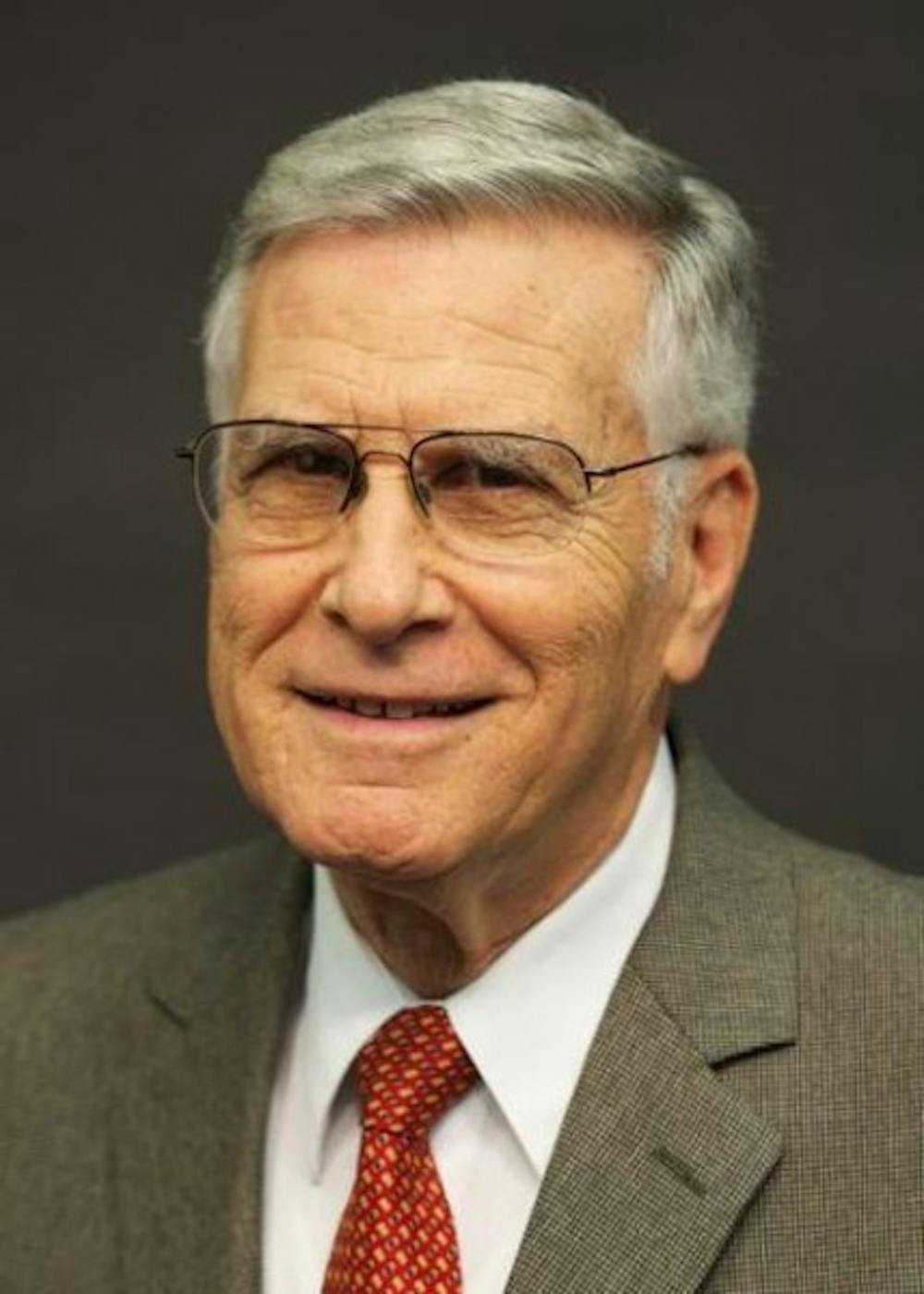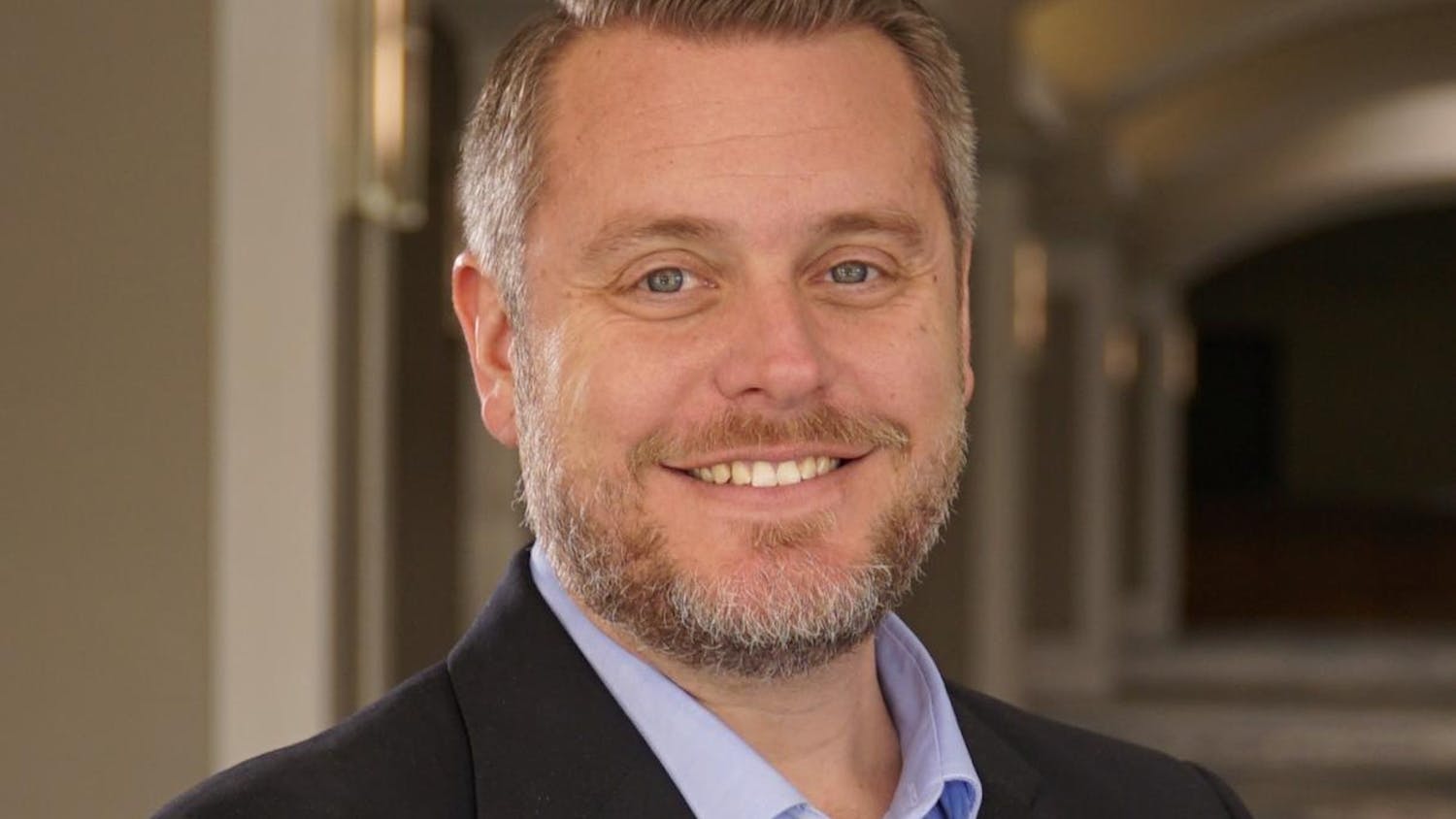Grinning widely, Ralph Lowenstein stood in front of colleagues, friends and loved ones, many of them smiling back, as he stood by the monument bearing his visage and his prophecy.
“Print on paper is dead.”
The monument is one of the features of the 21st Century News Laboratory, a newsroom outfitted to host UF journalism students of all disciplines — print, television, radio and online. The lab opened in late September.
Behind the technical impressiveness of the lab, deep in the history of Weimer Hall, lie the ideas of Lowenstein. His tenure as dean of the College of Journalism and Communications was marked by a continuous push for innovation. He oversaw the construction of Weimer Hall and brought the first computers to the college.
But apart from parlaying a career in journalism into a life as a dean of UF’s journalism college, Lowenstein has dedicated time to the remembrance of the about 1,300 American and Canadian Jews who traveled to Israel in 1948 to fight in its War of Independence.
At the age of 18, he was one of them.
He collected more than 500 individual files, 2,000 photos and hundreds of interviews, memoirs, and audio and video tapes.
The American Jewish Historical Society announced Thursday it is awarding Lowenstein its highest award, the Emma Lazarus Statue of Liberty. The award, according to a release from the organization, is given to “an individual who has demonstrated outstanding leadership and commitment to strengthening the American Jewish community.”
Lowenstein said he did not expect such recognition.
“It’s sort of like winning the lottery without buying a ticket,” he said.
He will receive the award at a May 4 ceremony in New York City.
The monument in Weimer Hall, standing about five feet tall and displaying a brief professional biography of Lowenstein, stands as a testament to the vision of a man who is always looking forward but never forgets to look back.
Lowenstein arrived at UF in 1976. It was then, as the new dean of the College of Journalism and Communications, that he made the statement declaring the death of print on paper.
Reporters mocked him, editors were mildly interested, and his contemporaries at other schools lampooned his vision.
He knew that to most, it sounded like a joke, an outlandish theory. But he didn’t care.
“I wasn’t insulted. I thought it was funny because I’ve always felt that if people are that stupid, it gives me a better chance, you know?” he said.
“I was so confident that I was right.”
He had developed his idea during his years of studying communication at the University of Missouri. Inspiration came from the British Broadcasting Corporation’s Ceefax, a service started in 1974 after BBC engineers wanted to develop a way to deliver captions for deaf people watching television.
Part of it was also just Lowenstein’s common sense.
“It’s just so logical — print on paper is such a wasteful means of distribution,” he said.
By 1982, he had pushed to bring the first computers to the college.
Two years later, he founded Gainesville Cable Press, a Ceefax-like service that was run by students and updated 18 hours a day.
Even in the time leading up to his retirement in 1994, he pushed for the college to help jump-start the The Gainesville Sun’s online presence: SunOne.com.
Given his accomplishments, Lowenstein still won’t fully accept the title of a visionary.
His day-to-day life is modest. As dean emeritus, he comes to work early in the morning, spends a lot of time with his wife, Bronia, and plays tennis on Sunday mornings.
From time to time, he’ll visit a Jewish cemetery at the edge of town, where he’s reminded of a part of his identity that he holds dearly.
When Lowenstein traveled to Europe in the summer of 1948, it was to spend six weeks working on English farms that had been left shorthanded after the war.
The trip was part of a summer exchange program for students. After the month, he would spend some time touring Europe alone before returning home.
That was what his mother and father believed. It was what Columbia University, where he had just finished his freshman year, had arranged. To his brothers, it was all the 18-year-old Jewish boy from Danville, Va., wanted to do.
The Arab-Israeli War, known by Jews as the War of Independence, had just begun, gripping the newly formed nation. The students’ passports were stamped “not valid for travel to a foreign country.” The U.S. did not want American Jews to volunteer in a foreign army.
He finished his work on the farms and found his way to Paris, where he set out to look for the newly formed Israeli embassy.
Knowing no French, he looked through a phone book for “Juif”, or Jew. He found one listing — a kosher butcher — and went to it.
The butcher understood English and told him how to get to the embassy, which Lowenstein said was barely up and running.
“When I got there, they were still nailing up the walls,” he said.
He told the secretary that we wanted to volunteer in the Israeli Army.
Without a word, she gave him a thin slip of paper with an address.
From there, Lowenstein went to a small studio apartment, where he met the men who would smuggle him to Israel.
They had three different Jewish doctors examine him, and they took away his passport and gave him fake papers. He spent two weeks in displaced-persons camps in Marseilles before being shipped out.
Ten days after evading the eyes of UN observers and being smuggled into Israel, Lowenstein was behind the wheel of a half-track during battle.
He had no military experience. He had no basic training. He could drive, and he was willing to risk everything.
“I was willing to give my life,” he said.
He finds it funny now when people ask him if he was afraid of losing his U.S. citizenship.
“If you decide that something’s worth losing your life over, truthfully, citizenship is second.”
Lowenstein finds peace through beautifying the Jewish cemetery at the corner of University Avenue and Waldo Road.
Walking slowly along the concrete path, he thinks out loud about the password for the lock posted at the entrance gate. Posted is a Hebrew word, repeated: “chai chai.” It is the Hebrew word for “life.”
“Ironic for a cemetery,” he said. ”Everybody’s dead.”
He spearheaded the project to build a Holocaust memorial there, a memorial he designed. It stands about 6 feet tall, with a blue Star of David painted on the top. One-third of the star has been chipped away, a way Lowenstein devised to remind those of the number of Jews killed during the Holocaust.
He looks silently at the inscription on the side of the monument, which reads:
“To them I will give in my house and within My walls a memorial And a name better than that of sons and daughters; I will give them an everlasting name which will not be cut off.” - Isaiah 56:5
“It’s not really a memorial,” Lowenstein said. “It’s tombstone for 6 million men, women and children.”






